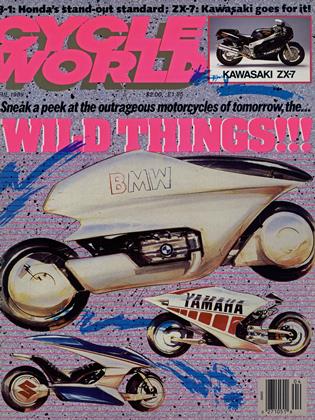CW BOOK REVIEW
Geoff Duke: In Pursuit of Perfection
Osprey Publishing Distributed by Motorbooks International 192 pages, hardcover $27.95
FIRST THERE WAS JOHN SURTEES AND then the great Mike Hailwood, their places in the pantheon of motorsports heroes assured as much by their shifts into the high-visibility world of Formula One auto racing as by their outstanding success as motorcycle roadracers.
But before either of them there was Geoff Duke, who dominated European roadracing in the early 1950s with four 500cc world championships (1951, 1953, 1954 and 1955), with 350cc world championships in 1951 and 1953 and with six firstplace finishes at the Isle of Man TT— three on 500cc bikes, two on 350cc machines and one in the production class.
This book is an account by Duke of his entry to motorcycling as a wideeyed youngster and his retirement from it, at least as an active participant, as a cynical veteran who watches while the British motorcycle industry collapses around him. It is written in a low-key, first-person style, without benefit of the as-toldto co-writers common these days in the world of celebrity books. As a result, the early chapters of the book seem just a bit naive, rather like a letter to mummy from a boy away at school.
But as Duke tells his story, which takes him through a stint as a World War II dispatch rider, onto the Norton factory trials team and ultimately onto the firm’s roadrace team as Britain awakened from the long nightmare of the war, the innocence of his early chapters fades. As Duke recounts the events of his career, his enthusiasm turns to a mild despair, the result of being banned from the European racing circuit for six months because of his support as a Gilera works rider for a riders' strike in Holland in 1955.
Being banned, he admits, was the beginning of the end for him. but what makes this book interesting is that the reader is able to see the other factors which led to Duke's retirement from active competition in 1959. The reader watches as Duke’s love for racing is tempered by crashes, injuries and hassles with factory racing bosses into a hard-nosed realization that racing-as-business may not be as much fun as it appears to be.
Fans of the Spencers and Lawsons of today’s racing world may not recognize the world Duke raced in. That’s because this book is a period piece, a not-quite-nostalgic look back at how motorcycling used to be. But as a highly personal window into not only the development of racing motorcycles now seen as classics but the decline of the industry that built them, it's worth reading, even if the sinking value of the dollar and the soaring comparative value of the pound Sterling push the price of this British-produced book beyond what most readers will wish to pay.
—Jon F. Thompson
 View Full Issue
View Full Issue
More From This Issue
-
 Up Front
Up FrontSo Many Curves, So Little Time
April 1989 By David Edwards -
 At Large
At LargeSilver Wing For A Silver Eagle
April 1989 By Steven L. Thompson -
 Leanings
LeaningsTen Percenters
April 1989 By Peter Egan -
 Letters
LettersLetters
April 1989 -
 Roundup
RoundupHonda's Spada: the Newest World Standard
April 1989 By David Edwards -
 Roundup
RoundupHailwood Ducati For Sale: $19,000
April 1989







